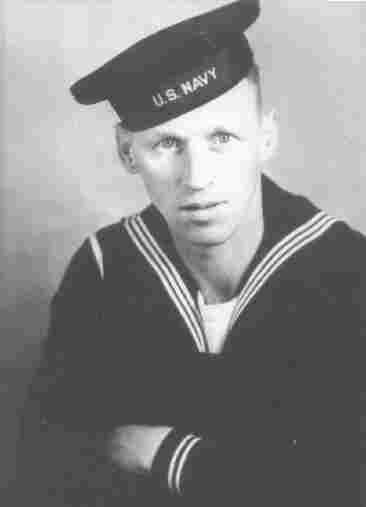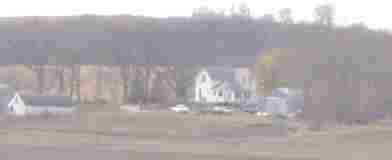| FROM JUDGED
 MY FATHER, FISHERMAN MY FATHER, FISHERMAN
My Father was an honest and frugal man. I have often wished those traits were genetic, but I am proof they are not. He was by nature, a conscientious worker, never learning the pleasure of wasted time on play or simply sitting. His house was for eating and sleeping, both of which he did quickly. He preferred to be outdoors on his beloved Dairy Farm next to Lake Geneva in Southern Minnesota, or in his barn tending his contented cows. At night, after working his allotted sixteen hours, he went to bed, and was asleep before his pillow stopped settling. One might wonder how his four children originated.
Dad usually had at least twenty cows milking, or as he said, "freshened" or "producing" which he thought sounded more elegant. Dad bought the farm with a GI loan in 1945, after retiring from the Navy after three exciting years of travel through the islands of the South Pacific. When I graduated in 1948, Dad bought his first luxury, a Surge milking machine, to help him not miss his wayward son who wanted to be a writer. Over the years, I would find time to return for visits.
As I became more prosperous, I tried to influence him to take time off, even offering to tend his cattle, so he could take my Mother on their first vacation. Navy men did not consider three exciting years boating in the South Pacific, courtesy of the selective service as vacation, nor did Mom appraise those years she ruled and protected the family, a vacation. Dad did not have the ability to do just nothing, nor the extravagance to spend hard-earned money on anything that was not an absolute necessity.
This memory concerns an adventure with my father one April, back in the eighties when I was returning from a business trip to a large publishing company in Des Moines. Whenever I passed close to the farm, I would invite my parents out for dinner. This invitation always pleased my Mother, and she eagerly accepted. Dad usually agreed, in spite of his concern for his cows and the unpleasant need to wear his navy issue bridgework. The cows just held on to their milk a little longer, on those occasions. Dad did like eating different food than what Mother prepared, even if he would not buy it. I do not believe Dad had taken Mother out to eat in a restaurant during the entire time of their marriage.
A sumptuous breakfast including fried potatoes and pie, always followed morning chores. Few refused breakfast at the farm, when invited. Lunch was a serve-yourself buffet style from a well-spread table but the evening dinner always involved meat, potatoes and gravy. Evening chores followed and provided exercise to settle a large meal and provide impetus for sleep. Mother always prepared a lunch, if they were away for the day, shopping or attending a farm auction. Necessary trips all took place between the morning and evening milking, which could be somewhat delayed. Frankly, I would rather eat at the farm but I felt nobler taking Mother out to eat.
It was raining lightly, and had rained heavily on and off for two weeks, so I knew Dad could not be in the muddy fields. I drove into the yard, ignoring the barking sheepdog, to meet my father coming out of the barn. I said, "How about steaks at the Geneva Truck Stop?"
Dad said, "I'd love to Son, but I have to go fishing tonight, after chores. You waste so much money on your fancy fishing trips, I'll show you how I do fishing for free." This I had to see. My Dad fishing? We all know fishing is the most relaxing of all leisure activities. I knew he could not do that so I had to see what he called fishing. Dinner out was out.
To mollify Mother, I decided to go in to Albert Lea, the nearby county seat, and get two large special pizzas with everything. I do not like pizza, but both of my parents considered it a rare and tasty treat. This would spare me from helping with the chores, and give my mother a meal preparation respite. I was going fishing with my father.
Two hours later, Dad came in from the barn, ready to fish. He told Mother to keep the pizza warm, and we would be back in an hour with a tub of fish. Dad was in barn clothes and I wore a business suit, which was well wrinkled from a three hour drive but presentable enough for a tub of fish. Dad assured me that it would not matter, as he didn't have boots for me, so I would stay out of the way, on the tractor.
We went to the machine shed. Dad started the big Oliver Diesel, and jumped down to rummage under the workbench, while it warmed. He emptied miscellaneous spare parts of farm machinery from a rusty wash tub and wired it on the draw bar of the tractor with an expertly twisted strand of old baling wire.
"Let's go fishing," he said. And soon we were chugging down the lower field driveway toward the tarred Hollandale Road. The south forty acres of land across that road lay between two drainage ditches that flowed directly into Lake Geneva. Every rainy spring, the lake level flooded over the ditch embankments and adjoining fields. The waters again claimed those fields, once part of the lake. Remnants of the recent flooding remained in one large shallow pond, which in the tractors lights, seemed crisscrossed by thousands of invisible motorboats. Gigantic Carp cruising, barely submerged by the shallow water formed those surging swells. In their irrepressible annual quest of spawning grounds, they had foolishly swarmed over the flooded ditch banks and had lingered too long performing their conjugal tasks. Draining water level left them marooned in Dad's most fertile cornfield.
Crops grew extremely well in rich peat bog lowland that had been part of a giant glacial lake. Years of accumulating soil eroded from the nearby hills left the once sandy bottom covered by highly nutrient residue of silt and at least three feet of decayed Wild Rice, Water Lilies and Cattails. That lake detritus would someday be coal. Dutch settlers in the nineteen-twenties had drained all of the giant swamp that the lake had become. A few square miles of the deepest part was impounded and enhanced by a dam and was now Lake Geneva.
Floodwaters drained quickly through the peat to the ancient porous sandy footing, surprising these aquatic visitors by the sudden drop of water level. Marooned fish were still frolicking there and Dad began fishing in earnest. He told me they were mostly Carp that he swore were a delicacy, but did require expert and laborious preparation. Consequently, he took only the firm fleshed Northern Pike, which tasted great, fried, boiled or baked. The carp he left were destined to fertilize corn, Indian style.
Plowing through the muddy field around the shrinking pond, ponderously swerving the almost mired tractor to use its lights, he soon had found enough prime pike to nearly fill the tub and we had completely rutted the area surrounding the water.
Teasing, I said, "I thought you wanted a tub full."
Dad stopped the tractor, and went back, picking up two of the slimy Carp that still wriggled, though marooned by the fickle water. "Well, here's two mud pike I'll fix for you the way my Grandpa taught me. A real favorite treat of our old kraut ancestor, Johann Wilhelm. Carp were the only fish in the swampy ponds of Saxony, and his secret recipe was the only way to make them edible."
I had never heard my father joke. "You can't be serious. Nobody eats those mud suckers."
"Son," he said as the tractor slogged back, tires tossing great chunks of mud skyward, "You have much to learn. As my eldest offspring, I'll bequeath you this ancient recipe our family has handed down father-to-son for generations."
Dad wore a wry grin, illuminated by the bouncing tractor's rear light, and I suspected that my austere and ever pragmatic father might be jesting, which made our outing unique, and I laughed appreciatively.
"The recipe must be followed exactly," My dad said straight-faced, "Or the sweet delicate taste of spawning Carp will turn sour and taste like mud! This is his secret, my family heritage. I share this secret menu with you, hopefully increasing the demand for Carp, and even their possible extinction.
THE SECRET
Outdoors, after the sun goes down, gut one live Carp,  exposing the stomach cavity to running water until all pink is gone. Then cut near through, just behind the gills, and stake the spread out fish to an unpainted cedar shingle, belly-up with sides spread to the side and tacked. Do not use Iron Thumbtacks. Brass is fine, but make sure they are not painted. exposing the stomach cavity to running water until all pink is gone. Then cut near through, just behind the gills, and stake the spread out fish to an unpainted cedar shingle, belly-up with sides spread to the side and tacked. Do not use Iron Thumbtacks. Brass is fine, but make sure they are not painted.
Then brush the entire inside surface of the fish with red clover honey and liberally sprinkle with a half and half blend of nutmeg and cinnamon. Place the staked fish in a galvanized dishpan big enough for the fish and shingle to lay completely flat. Place green apple slices in the body cavity, and sprinkle liberally with a mixture of ocean salt and brown sugar. Cover the contents with a mixture of half elderberry wine and fresh rainwater. Cover the crock, with unbleached muslin and set in a warm place for exactly four days. Then your treat is ready to eat. Ever so carefully, remove the thumbtacks with a pliers, carefully leaving fish scales undisturbed. Then throw away the putrid carp and eat the shingle.
This loving memoir of my father is included in JUDGED, published by Print America, and is available autographed and discounted on BosackerBooks, for only $21.00 postage paid. Order today and keep this first edition book as a treat and wise investment.
|
